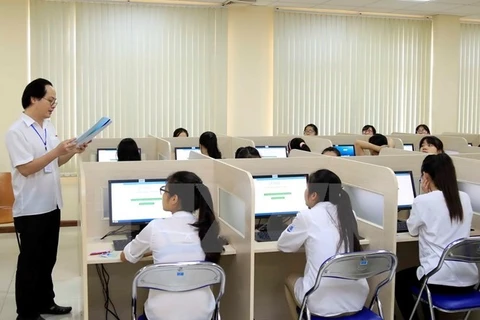Hanoi (VNS/VNA) - Internet users in Vietnam, especially children, face many risks online, according to experts.
Nguyen Quang Dong, Director of the Institute for Policy Research and Communication Development, told Tuoi tre (Youth) newspaper that the issue is rooted in the weak awareness and poor digital security skills of internet users, including children.
“Using the internet and smartphones in Vietnam is like sitting on a big vehicle on a highway but without knowing safe driving skills. Without safe driving skills, even if the road is nice and good, an accident can happen easily,” said Dong.
“Our digital security skills education is very limited,” he said.
A deeper-rooted problem is that education has not been updated on technology trends, leading to a lack of training on digital security.
Teaching content is often lacking vividness and is rigid, so it is difficult to win children’s attention, he said.
Besides, in family education, parents can easily provide computers and smartphones for their children, but they do not have enough knowledge and skills to guide and supervise them on safe use.
“Safeguarding in digital environments is a big challenge,” said Dong.
From the State's perspective, there are two jobs that are most important. The first is that educational programmes for citizens must feature not only computer knowledge but also digital skills.
Schools must have a digital skills subject instead of today's computer science. In this subject, students would not only learn programming, how to create files, software and word processing, but also how to behave on social networks.
“Teachers should teach children to distinguish inaccurate information, what is bullying on social networks, what to do when faced with bullying on social networks and teach children not to share any personal information on social media which can lead to long-term risks,” he said.
Dong said this subject must be educated early because preschoolers also have exposure to digital devices.
Communication on digital security
Dong said he believed ministries also needed to implement a broad nationwide communication programme on digital security.
“In the past, we had traffic safety campaigns, nowadays we also need campaigns on safety in the digital environment because the harmful effects of unsafety on the internet are as great as traffic insecurity,” he said.
Vietnamese businesses and social networks in Vietnam have not paid much attention to the classification of information content to suit users’ ages.
In developed countries, said Dong, they carry out labelling for different ages. State regulators must monitor compliance with content classification for labelling and comply with corporate user protection responsibilities.
Social organisations also play a very important role in building awareness campaigns.
“I want to emphasise the synchronisation of State management agencies, businesses, and social organisations that will solve the problem comprehensively, more systematically and methodically. This is a long story, not a year or two, but a very long process for many years to come,” said Dong.
On the sidelines of the seminar on Early Education through interactive books held by the French Institute in Vietnam and Dinh Ti Books on October 24 in Hanoi, education expert Lai Thi Hai Ly told Tuoi tre that at present, many children are being "activated" by television and YouTube because their parents "release" their children to televisions and electronic devices.
“Some children watch television a lot, imitate English speaking on television very well, so their parents think they are a prodigy, but in fact, the child is just like a parrot with no thinking and no response. These children gradually only know to interact with televisions and the screens of electronic devices but lose the ability to interact and connect with people around them,” said Ly.
Ly suggested parents take their children out so they can interact with other people and the world around them.
Interactive books for children between zero and six years old are also a good choice, she added.
“The book is both like a child's toy, for children to touch, interact with and a tool for parents to connect with children because interactive books force parents and teachers to read with their children,” she said./.
Nguyen Quang Dong, Director of the Institute for Policy Research and Communication Development, told Tuoi tre (Youth) newspaper that the issue is rooted in the weak awareness and poor digital security skills of internet users, including children.
“Using the internet and smartphones in Vietnam is like sitting on a big vehicle on a highway but without knowing safe driving skills. Without safe driving skills, even if the road is nice and good, an accident can happen easily,” said Dong.
“Our digital security skills education is very limited,” he said.
A deeper-rooted problem is that education has not been updated on technology trends, leading to a lack of training on digital security.
Teaching content is often lacking vividness and is rigid, so it is difficult to win children’s attention, he said.
Besides, in family education, parents can easily provide computers and smartphones for their children, but they do not have enough knowledge and skills to guide and supervise them on safe use.
“Safeguarding in digital environments is a big challenge,” said Dong.
From the State's perspective, there are two jobs that are most important. The first is that educational programmes for citizens must feature not only computer knowledge but also digital skills.
Schools must have a digital skills subject instead of today's computer science. In this subject, students would not only learn programming, how to create files, software and word processing, but also how to behave on social networks.
“Teachers should teach children to distinguish inaccurate information, what is bullying on social networks, what to do when faced with bullying on social networks and teach children not to share any personal information on social media which can lead to long-term risks,” he said.
Dong said this subject must be educated early because preschoolers also have exposure to digital devices.
Communication on digital security
Dong said he believed ministries also needed to implement a broad nationwide communication programme on digital security.
“In the past, we had traffic safety campaigns, nowadays we also need campaigns on safety in the digital environment because the harmful effects of unsafety on the internet are as great as traffic insecurity,” he said.
Vietnamese businesses and social networks in Vietnam have not paid much attention to the classification of information content to suit users’ ages.
In developed countries, said Dong, they carry out labelling for different ages. State regulators must monitor compliance with content classification for labelling and comply with corporate user protection responsibilities.
Social organisations also play a very important role in building awareness campaigns.
“I want to emphasise the synchronisation of State management agencies, businesses, and social organisations that will solve the problem comprehensively, more systematically and methodically. This is a long story, not a year or two, but a very long process for many years to come,” said Dong.
On the sidelines of the seminar on Early Education through interactive books held by the French Institute in Vietnam and Dinh Ti Books on October 24 in Hanoi, education expert Lai Thi Hai Ly told Tuoi tre that at present, many children are being "activated" by television and YouTube because their parents "release" their children to televisions and electronic devices.
“Some children watch television a lot, imitate English speaking on television very well, so their parents think they are a prodigy, but in fact, the child is just like a parrot with no thinking and no response. These children gradually only know to interact with televisions and the screens of electronic devices but lose the ability to interact and connect with people around them,” said Ly.
Ly suggested parents take their children out so they can interact with other people and the world around them.
Interactive books for children between zero and six years old are also a good choice, she added.
“The book is both like a child's toy, for children to touch, interact with and a tool for parents to connect with children because interactive books force parents and teachers to read with their children,” she said./.
VNA























